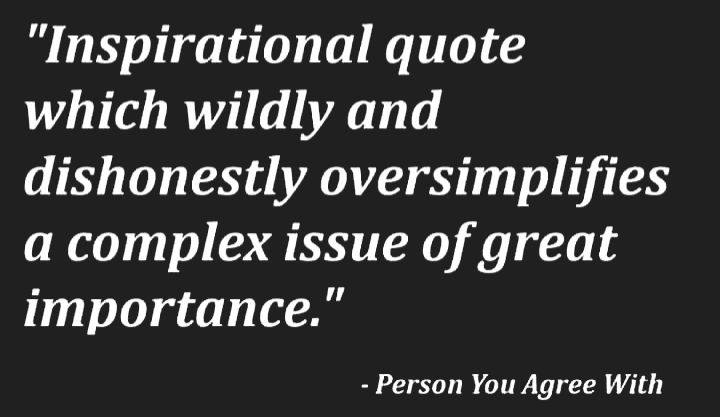
Memés have become a favorite way to communicate on social media along with the short spicy tweet. But, that creates a problem. To reduce a complex problem to a 160-word summary almost always leads to a misrepresentation of the problem. And, that representation is always in favor of a position in which you believe and against one with which you disagree.
I have rarely, if ever, seen a serious memé that was accurate. Rather, memés have become a hotbed of logical fallacies. I would say that the most common is the fallacy of false equivalence (or questionable analogy) while the second most common would probably be the tu quoque or the appeal to hypocrisy or whataboutism. But, there are any of multiple logical fallacies that are found in memés.
The false equivalence is used all the time in memés. It is also nicknamed the apples and oranges. It is troublesome both because it is so commonly found in memés and because it has become the favorite response of people to many memés they do not like. I saw a recent one which showed a detainment camp for illegal immigrants and said that if we could build those camps, then we should certainly be able to build equivalent camps for the homeless veterans in this country.
I am a veteran and I am all in favor of helping our homeless veterans. However, the issue of our homeless veterans is much more complex than simply external housing. Many of our homeless veterans have mental illness challenges. I know of various who would refuse to live in those camps for any of various reasons.
It is also a false equivalence because the reality is that many of our citizens would highly object to providing such free housing to the homeless of our country while being all in favor of detainment camps for illegal immigrants. Many would insist that the homeless camps be connected to some type of workfare. As the rules pile up, we would find out that there would be many homeless who do not want to live under such rules. This is quite different from the involuntary detainment of Immigrations and Customs Enforcement. You might as well argue that if we build prisons then we should build homeless camps. They are two quite different and unrelated issues. In other words, apples and oranges.
At the same time, there is an overuse of apples-and-oranges as a response to other people. I have seen well-crafted arguments dismissed as apples-and-oranges without the dismissive person explaining why he or she considers the dismissed argument to be apples-and-oranges. In other words, this logical fallacy is now misused to avoid having to discuss an issue. In this case, the apples-and-oranges argument is misused and becomes an ad hominem (against-the-man) argument in which the author of the argument is being falsely accused so that the person making the accusation does not have to respond to the argument. The key is that when you read someone saying apples-and-oranges with no explanation as to why they are saying apples-and-oranges, then you can safely ignore that comment. It is a drive-by troll comment.
The second most common charge is what-about-ism, the tu quoque fallacy. Most often, it is a form of an ad hominem (against-the-man) argument. It claims that there is a hypocrisy that makes it impossible for the person whom you are attacking to make the request or to push a certain policy or to support a law, etc. Nowadays, almost every time an important person makes a statement, you can see people opposed to their position begin a process of data mining everything that person has ever said to see if they can find a quote which they can use to claim that the person is a hypocrite.
I recently saw a memé which accused a climate change activist of being a hypocrite because he boarded an airplane. We have all been aware of the typical response to some figure of deliberately data mining their past to see if they made a statement that would nowadays be considered to be inappropriate. There is neither forgiveness in this approach nor is there a recognition that a person may change over the course of time.
Here is the basic logical problem of what-about-ism. Even if you could find some hypocrisy in the person’s past, that does not mean that what they are saying right now is incorrect. What-about-ism completely ignores the argument the person is making in order to attack the person themselves. While there are certain subjects which require the consistency of the person making the argument, the reality is that many issues bear no relation to the personal probity of the person. Particularly in certain aspects of international relationships, an utterly immoral, ruthless person may yet have the correct approach to appropriately maintain the influence of our country in the world. Note that I said “appropriately.” In the history of our country, we have had some utterly ruthless persons, such as Kissinger, who yet engineered some of the most admired foreign policy initiatives.
So, when you use a memé on social media, please place some explanatory comments that show that you both understand the complexity of the issues and that you are not misusing the memé. The other option is to label the memé as humor, in which case we will not take it seriously, but will probably think better of you as a result.



Leave a Reply